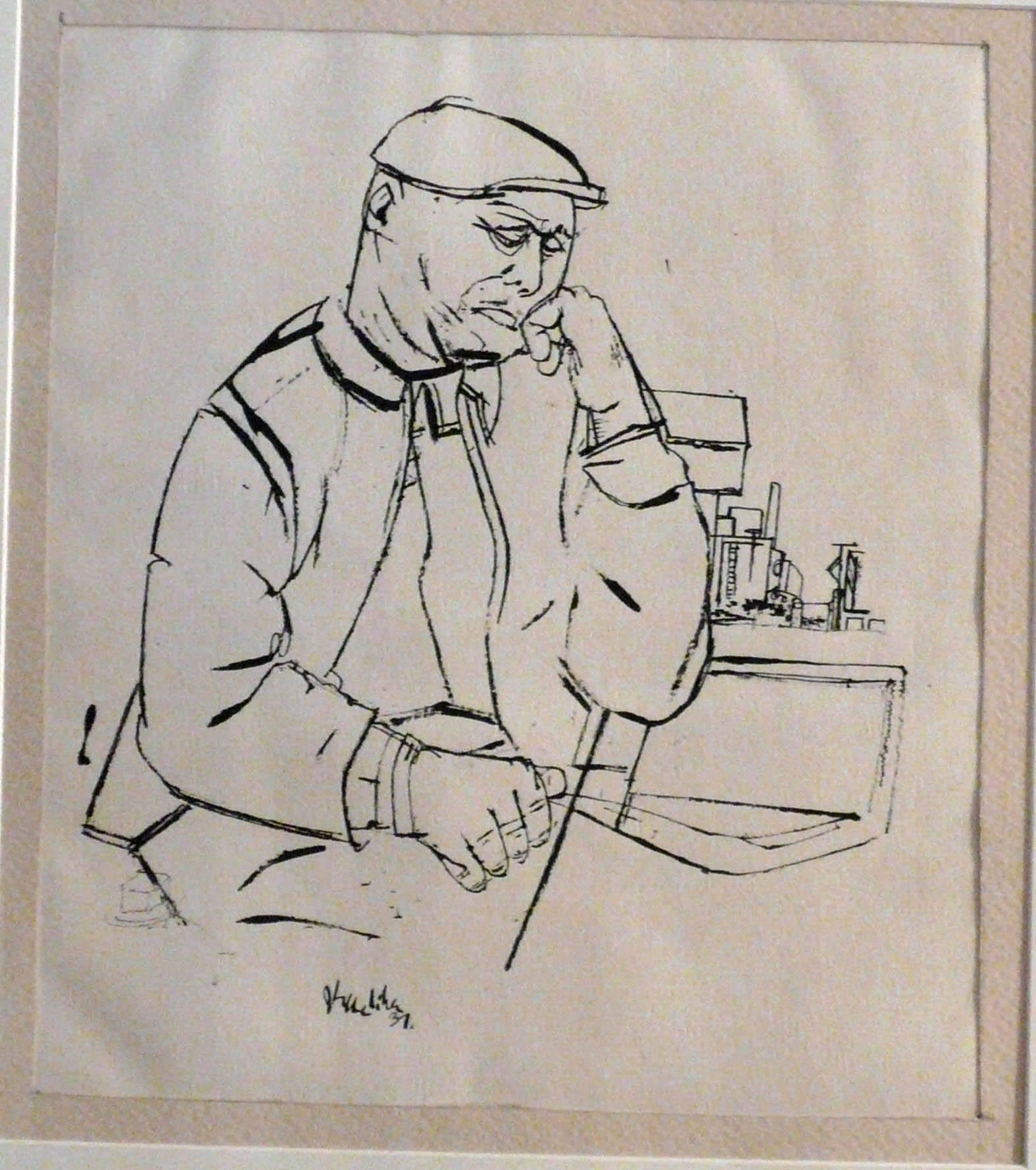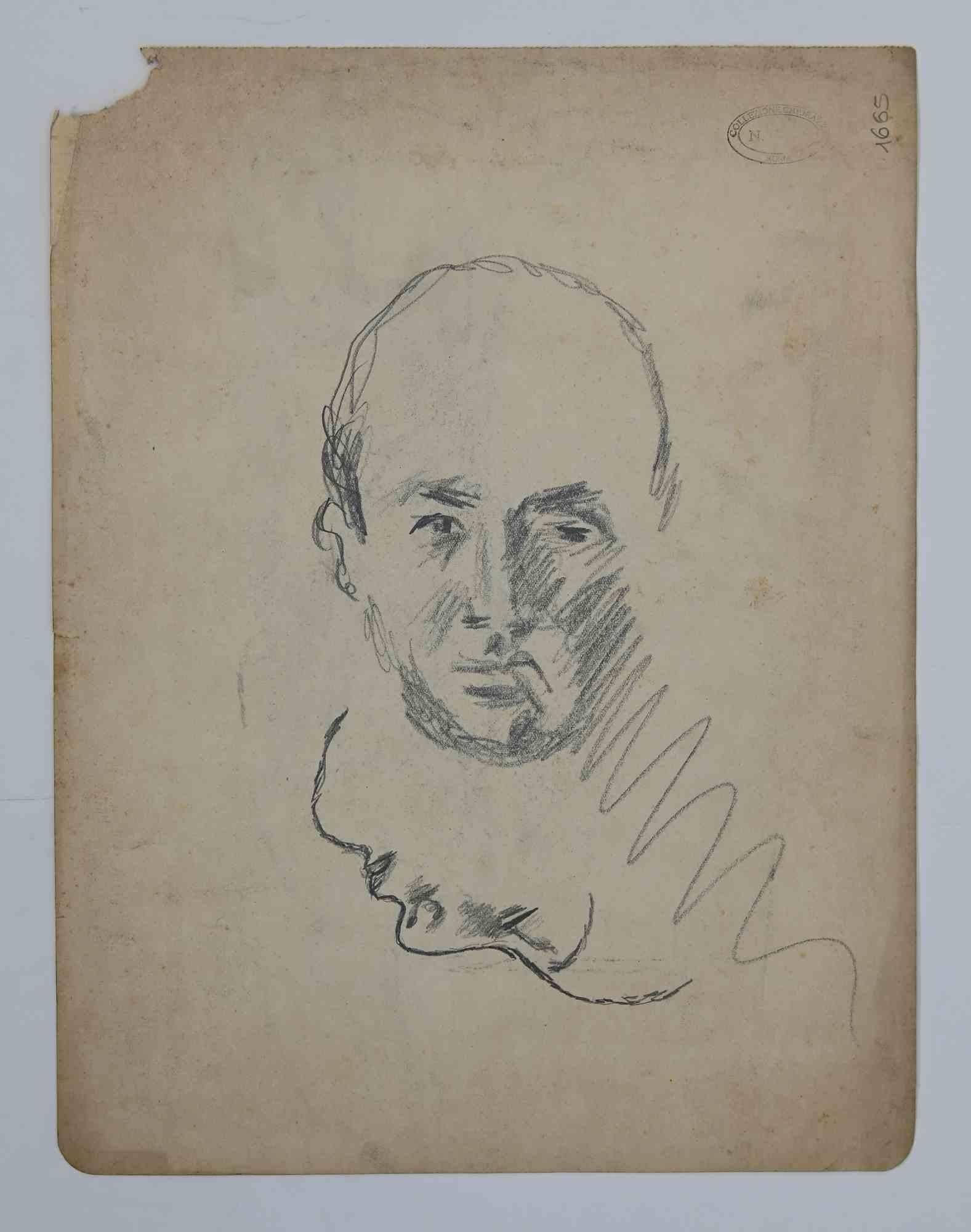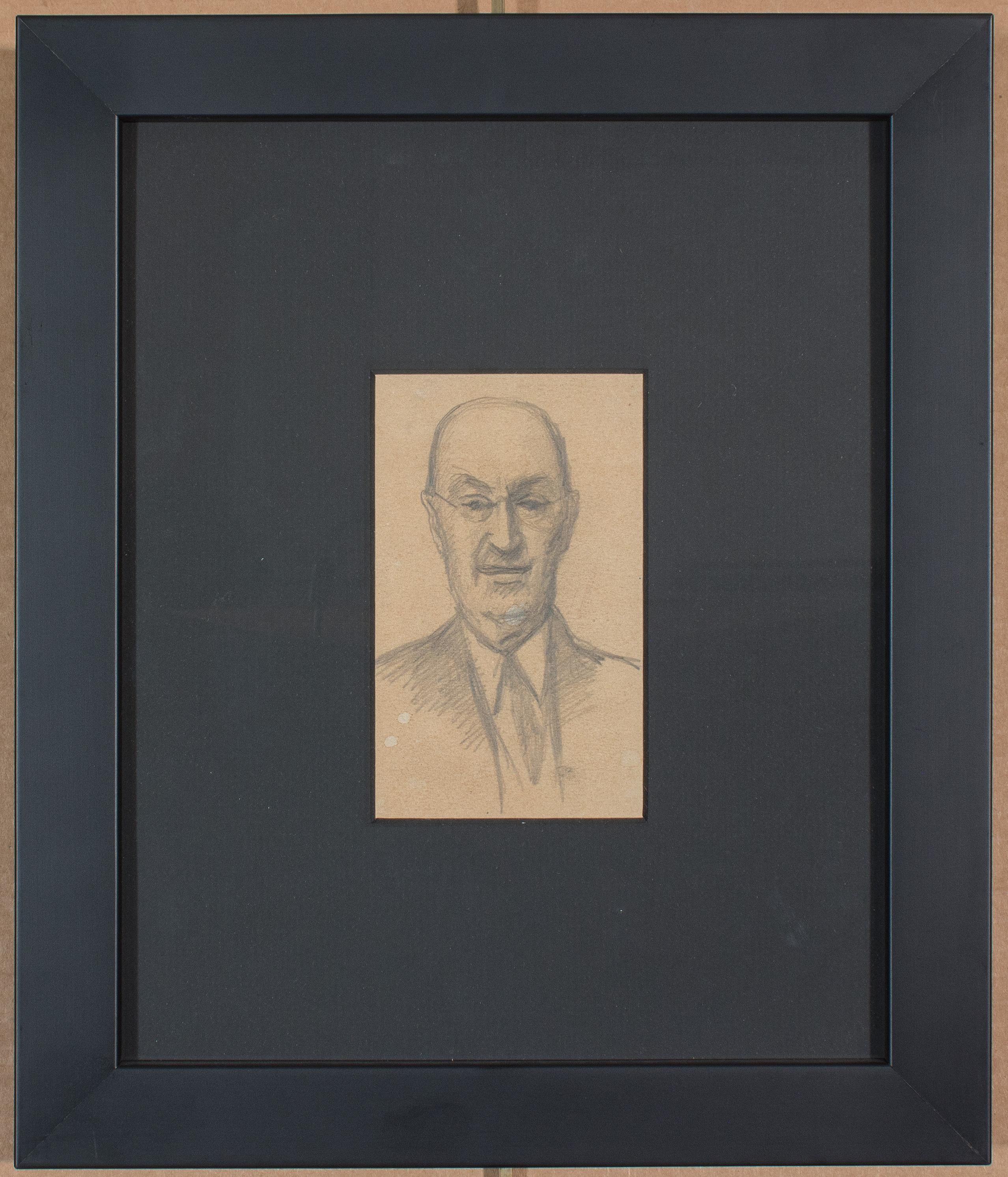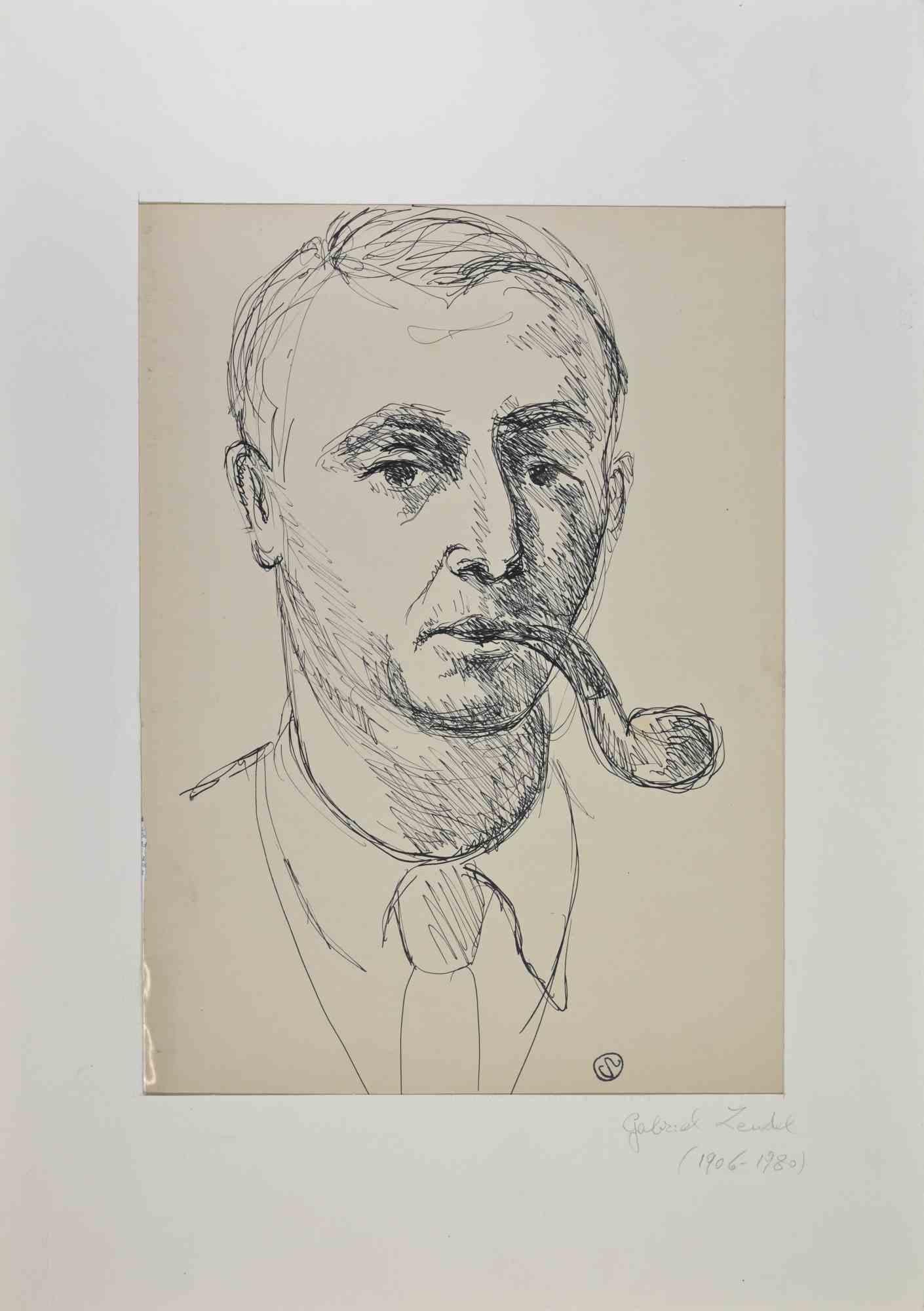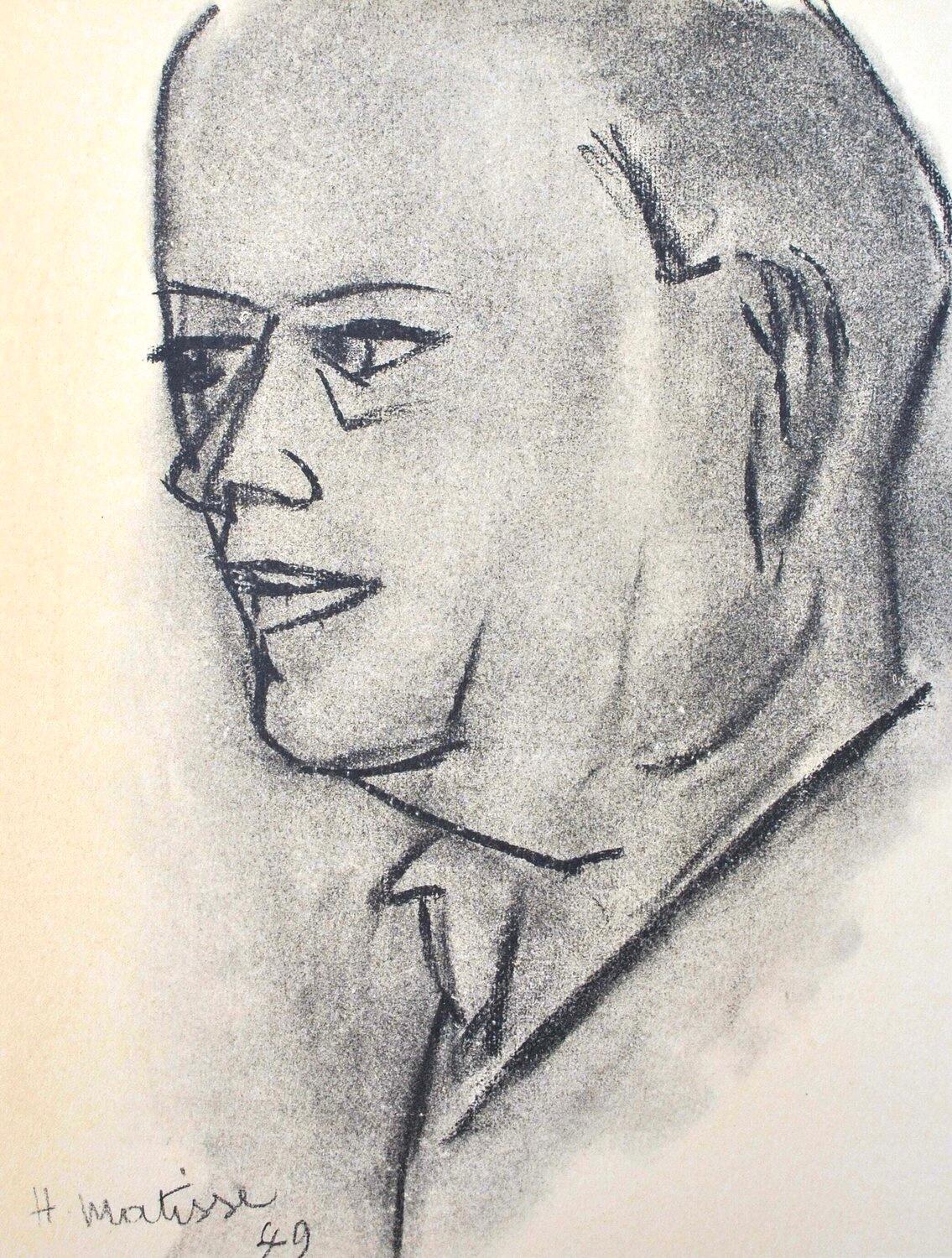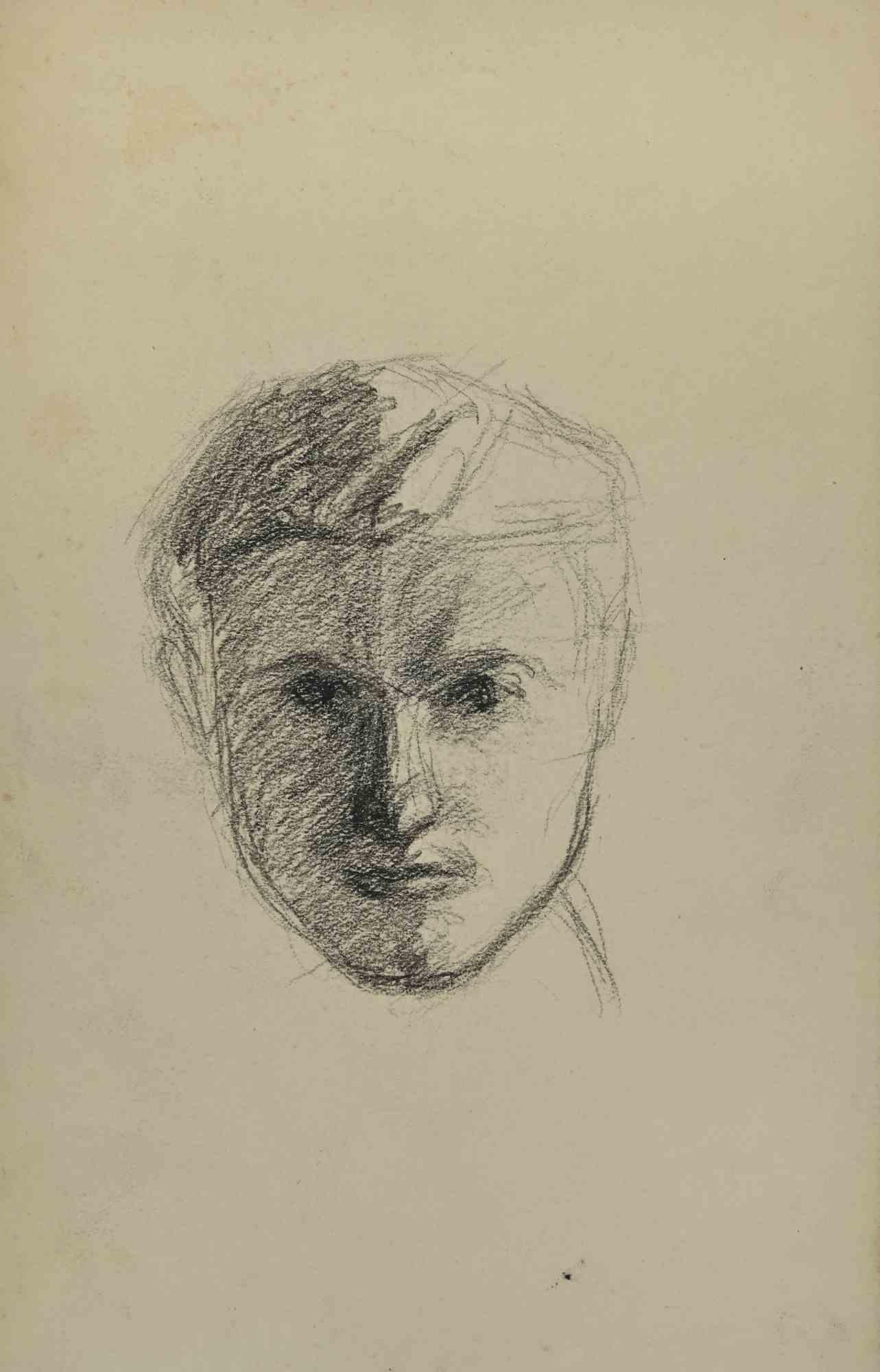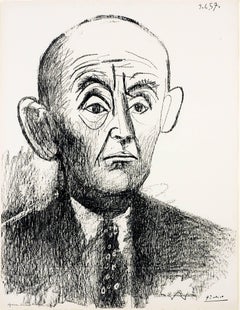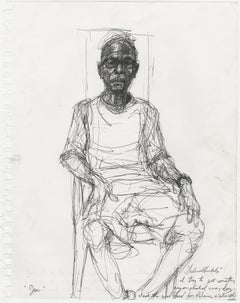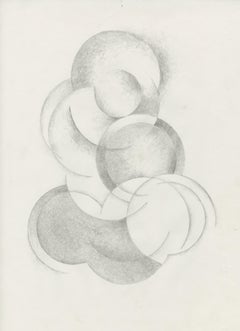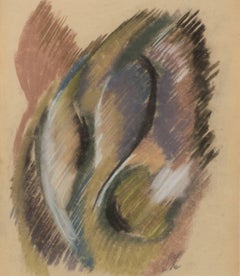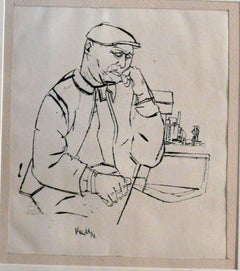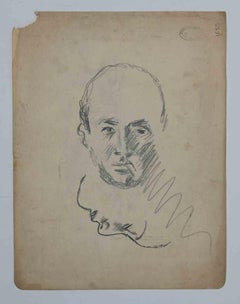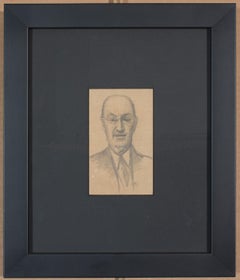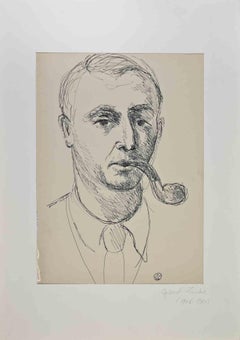Items Similar to Pablo Casals
Want more images or videos?
Request additional images or videos from the seller
1 of 7
August F. BiehlePablo Casals1963
1963
$1,750
£1,298.57
€1,512.65
CA$2,436.01
A$2,712.72
CHF 1,411.82
MX$33,447.51
NOK 17,980.62
SEK 16,900.04
DKK 11,286.27
Shipping
Retrieving quote...The 1stDibs Promise:
Authenticity Guarantee,
Money-Back Guarantee,
24-Hour Cancellation
About the Item
Pablo Casals
Graphite on paper, 1963
Signed in pencil lower right (see photo)
Sheet size: 11 5/8 x 8 inches
Condition: glue residue in all four corners of the sheet
Drawn from life during an appearance at Carnegie Hall with the Cleveland Orchestra Chorus where he conducted J.S. Bach: The Passion of Our Lord According to St. Matthew (see photo of handbill)
Regarding Casals: Pau Casals i Defilló
(December 29, 1876 – October 22, 1973)
"The great Spanish cellist (and conductor), Pablo Casals (actually, Pau Carlos Salvador Defilló), legend has it, supported by Casals himself, that he was conceived when Johannes Brahms began his B-flat Major Quartet, of which Casals owned the original manuscript, and that he was born when J. Brahms completed its composition. This legend is rendered moot by the fact that the quartet in question was completed and performed before Casals was even born. But even the ascertainable facts of the life of Casals make it a glorious tale. His father, the parish organist and choirmaster in Vendrell, gave Casals instruction in piano, violin, and organ. When Casals was 11, he first heard the cello performed by a group of traveling musicians, and decided to study the instrument. In 1888 his mother took him to Barcelona, where he enrolled in the Escuela Municipal de Música. There he studied cello with José García, theory with José Rodoreda, and piano with Joaquín Malats and Francisco Costa Llobera. His progress as a cellist was nothing short of prodigious, and he was able to give a solo recital in Barcelona at the age of 14, on February 23, 1891; he graduated with honors in 1893. Albéniz, who heard him play in a cafe trio, gave Pablo Casals a 1etter of introduction to Count Morphy, the private secretary to María Cristina, the Queen Regent, in Madrid. Casals was asked to play at informal concerts in the palace, and was granted a royal stipend for composition study with Tomás Bretón. In 1893 he entered the Conservatory de Musica y Declamacion in Madrid, where he attended chamber music classes of Jesus de Monasterio. He also played in the newly organized Quartet Society there (1894-1895). In 1895 he went to Paris and, deprived of his stipend from Spain, earned a living by playing 2nd cello in the theater orchestra of the Folies Marigny. He decided to return to Spain, where he received, in 1896, an appointment to the faculty of the Escuela Municipal de Música in Barcelona; he was also principal cellist in the orchestra of the Gran Teatro del Liceo. In 1897 he appeared as soloist with the Madrid Symphony Orchestra, and was awarded the Order of Carlos III from the Queen. His career as a cello virtuoso was then assured. In 1899 Pablo Casals played at. the Crystal Palace in London, and later for Queen Victoria at her summer residence at Cowes, Isle of Wight. On November 12, 1899, he appeared as a soloist at a prestigious Lamoureux Concert in Paris, and played with Lamoureux again on December 17, 1899, obtaining exceptional success With both the public and the press. He toured Spain and Holland with the pianist Harold Bauer (1900-1901); then made his first tour of the USA (1901-1902). In 1903 he made a grand tour of South America. On January 15, 1904, he was invited to play at the White House for President Theodore Roosevelt. In 1906 he became associated with the talented young Portuguese cellist Guilhermina Suggia, who studied with him and began to appear in concerts as Mme. P. Casals-Suggia, although they were not legally married. Their liaison was dissolved in 1912; in 1914 Casals married the American socialite and singer Susan Metcalfe; they were separated in 1928, but did not divorce until 1957. Continuing his brilliant career, Pablo Casals organized, in Paris, a concert trio with the piariist Alfred Cortot and the violinist Thibaud; they played concerts together until 1937. Casals also became interested in conducting, and in 1919 he organized, in Barcelona, the Orquesta Pall Casals and led itsftrst concert on October 13, 1920. With the outbreak of the Spanish Civil War in 1936, the Orquesta Pau Casals ceased its activities. Casals was an ardent supporter of the Spanish Republican government, and after its defeat vowed never to return to Spain until democracy was restored. He settled in the French village of Prades, on the Spanish frontier; between 1939 and 1942 he made sporadic appearances as a cellist in the unoccupied zone of southern France and in Switzerland. So fierce was his opposition to the Franco regime in Spain that he declined to appear in countries that recognized the totalitarian Spanish government, making an exception when he took part ill a concert of chamber music in the White House on November 13, 1961, at the invitation of President John F. Kennedy, whom he admired. In 1950 Pablo Casals resumed his career as conductor and cellist at the Prades Festival, organized in commemoration of the bicentennial of the death of J.S. Bach; he continued leading the Prades Festivals until 1966. He made his permanent residence in 1956, when he settled in San Juan, Puerto Rico (his mother was born there when the island was still under Spanish rule). In 1957 an annual Festival Casals was inaugurated there. During all these years, he developed energetic activities as a pedagogue, leading master classes in Switzerland, Italy, Berkeley, California, and Marlboro, Vermount, some of which were televised. Pablo Casals was also a composer; perhaps his most effective work is La sardana, for an ensemble of cellos, which he composed in 1926. His oratorio El pessebre (The Manger) was performed for the first time in Acapulco, Mexico, on December 17, 1960. One of his last compositions was the Himno a las Naciones Unidas (Hymn of the United Nations); he conducted its ftrst performance in a special concert at the United Nations on October 24, 1971, 2 months before his 95th birthday. On August 3, 1957, at the age of 80, Casals married his young pupil Marta Montañez; following his death, she married the pianist Eugene Istomin, on February 15, 1975. Casals did not live to see the liberation of Spain from the Franco dictatorship, but he was posthumously honored by the Spanish government under King Juan Carlos I, which issued in 1976 a commemorative postage stamp in honor of his 100th birthday." Courtesy of Rare Classical Music
Regarding August F. Biehle
"The son of a German immigrant painter of decorative murals in Cleveland, Ohio, he achieved distinction as one of Ohio's most prolific and talented artists, especially noted for design and draftsmanship. His styles embraced Expressionism, Fauvism, Cubism, and American Scene Realism, and he worked in a variety of media including graphite, oil, gouache, pastel, tempera, and lithography.
He started drawing as a youngster and served as an apprentice to his father working on decorative commissions in Cleveland, Chicago, and surrounding areas. In 1903, when he was eighteen, he went to Munich to study at the Kunstgewerbeschule, a respected arts and crafts school. In 1908, he began working as a color consultant to Sherwin Williams Paint Company, and two years later returned to Munich where he studied at the Royal Academy and came under the influence of various modernist movements. He became an important link between these styles and Ohio painters, joining the artists' colony led by Henry Keller near Sandusky.
In the 1920s and 30s, he did numerous American Scene paintings and painted WPA murals during the Depression. From 1913 to 1952, he earned his living as a lithographer but during this time painted independently. In the 1960s, he turned to complete abstraction.
He died in 1979, having had a career of nearly seventy years. His paintings have been in numerous exhibitions including the Cleveland Museum of Art, the Butler Museum in Youngstown, the Pennsylvania Academy of Fine Arts in Philadelphia and the Whitney Museum in New York City."
Courtesy: AskArt
- Creator:August F. Biehle (1885 - 1979, American)
- Creation Year:1963
- Dimensions:Height: 11.625 in (29.53 cm)Width: 8 in (20.32 cm)
- Medium:
- Movement & Style:
- Period:
- Condition:
- Gallery Location:Fairlawn, OH
- Reference Number:Seller: FA119471stDibs: LU1407406562
About the Seller
5.0
Recognized Seller
These prestigious sellers are industry leaders and represent the highest echelon for item quality and design.
Gold Seller
Premium sellers maintaining a 4.3+ rating and 24-hour response times
Established in 1978
1stDibs seller since 2013
795 sales on 1stDibs
Typical response time: 1 hour
Associations
International Fine Print Dealers Association
- ShippingRetrieving quote...Shipping from: Fairlawn, OH
- Return Policy
Authenticity Guarantee
In the unlikely event there’s an issue with an item’s authenticity, contact us within 1 year for a full refund. DetailsMoney-Back Guarantee
If your item is not as described, is damaged in transit, or does not arrive, contact us within 7 days for a full refund. Details24-Hour Cancellation
You have a 24-hour grace period in which to reconsider your purchase, with no questions asked.Vetted Professional Sellers
Our world-class sellers must adhere to strict standards for service and quality, maintaining the integrity of our listings.Price-Match Guarantee
If you find that a seller listed the same item for a lower price elsewhere, we’ll match it.Trusted Global Delivery
Our best-in-class carrier network provides specialized shipping options worldwide, including custom delivery.More From This Seller
View AllPortrait de D. H. Kahnweiler I
By Pablo Picasso
Located in Fairlawn, OH
Portrait de D. H. Kahnweiler I
Lithograph, 1957
Estate Signature Stamp lower right
Provenance: Picasso Estate
Marina Picasso, her stamp on reverse
Annotated in ...
Category
1950s French School Portrait Prints
Materials
Lithograph
Joe "I try to get something accomplished everyday. I ask the Good Lord...
By Sedrick Huckaby
Located in Fairlawn, OH
Joe "I try to get something accomplished everyday. I ask the Good Lord for Patience and Stregnth"
Verso: "I was in for a technical violation. I spent 65 days, but I thank the Lor...
Category
2010s Contemporary Figurative Drawings and Watercolors
Materials
Ink
Untitled
By Peter Marks
Located in Fairlawn, OH
Untitled (Circles)
Graphite on wove paper, 2007
Unsigned
Provenance: Estate of the Artist
Condition: Excellent
Sheet/Image size: 16 15/16 x 14 inches
Peter Marks (1935 -2010)
Pete...
Category
Early 2000s Abstract Abstract Drawings and Watercolors
Materials
Graphite
Untitled
By Leon Kelly
Located in Fairlawn, OH
Untitled
Pastel on paper, 1922
Initialed lower right (see photo)
Exhibited: Francis Nauman, Leon Kelly: Draftsman Extraordinaire, New York, April 4 - May 23, 2014.
Condition: Excell...
Category
20th Century American Modern Abstract Drawings and Watercolors
Materials
Pastel
$4,000
Abstraction
By Abraham Walkowitz
Located in Fairlawn, OH
Signed and dated in ink lower center
Provenance:
Charlotte Bergman, noted collector and patron of Walkowitz. See photo for additional information.
Category
1930s Modern Abstract Drawings and Watercolors
Materials
Ink, Pen
Lonly (Lonely)
By Stephen Longstreet
Located in Fairlawn, OH
Signed lower right
Provenance:
Joseph M. Erdelac, Cleveland, OH
Possibly deaccessed from the Columbus Museum of Art
THOMAS FRENCH FINE ART, LLC
Stephen Longstreet (1907-2002)
A...
Category
20th Century American Modern Figurative Drawings and Watercolors
Materials
Watercolor
You May Also Like
UNTITLED PORTRAIT
By John Heliker
Located in Portland, ME
Heliker, John. (American, 1909-2000). UNTITLED PORTRAIT. Ink on paper, not dated, likely 1930s. The image is of a man, likely a factory worker, seated, wearing a cap, leaning his face on one hand, with factory structures in the background. Signed, lower right. c. 8 x 8 inches 0n a larger sheet. In excellent condition.
Heliker was born in Yonkers and spent his adult life dividing his time between Manhattan, where he taught art for decades, and Great Cranberry Island...
Category
Mid-20th Century American Modern Portrait Drawings and Watercolors
Materials
Ink
Portraits - Drawing by Mino Maccari - Mid 20th Century
By Mino Maccari
Located in Roma, IT
Portraits is an original Pencil Drawing realized by Mino Maccari in mid-20th century.
Good condition on a yellowed paper.
Hand-signed by the artist with pencil, some sketches on th...
Category
Mid-20th Century Modern Figurative Drawings and Watercolors
Materials
Pencil
$541 Sale Price
25% Off
Portrait of a Man by Philadelphia artist Julius Bloch
By Julius Bloch
Located in Philadelphia, PA
Julius Thiengen Bloch
(American, born Germany, 1888–1966)
Portrait of a Man, c. 1943
Pencil on paper, 5 1/2 x 3 1/2 inches
FRAMED: 13 x 11 inches (approx.)
This sketch comes direct...
Category
1940s Realist Portrait Drawings and Watercolors
Materials
Paper, Pencil
Portrait - Drawing By Gabriel Zendel - Mid-20th Century
By Gabriel Zendel
Located in Roma, IT
Portrait is an artwork realized by Gabriel Zendel in the Mid 20th Century.
Ink drawing.
In good conditions.
Category
Mid-20th Century Modern Figurative Drawings and Watercolors
Materials
Paper, Ink
Matisse, Professeur René Leriche, Portraits par Henri Matisse (after)
By Henri Matisse
Located in Fairfield, CT
Medium: Collotype, héliogravure, recto and verso, on grand vélin Renage filigrané paper, as issued
Year: 1954
Paper Size: 12 x 9.25 inches; image size: 9.05 x 7.08 inches
Inscription...
Category
1950s Modern Figurative Prints
Materials
Lithograph
$716 Sale Price
20% Off
Portrait - Drawing by Joseph Alexander Colin - Mid-20th Century
Located in Roma, IT
Portrait is a drawing realized by Joseph Colin in the Mid-20th Century.
Pencil on ivory-colored paper
Good conditions with slight foxing.
The artwork is realized through deft expr...
Category
Mid-20th Century Modern Figurative Drawings and Watercolors
Materials
Pencil, Paper
More Ways To Browse
F F France And Son
August Holland
Socialite Painting
J King Paintings
Vintage Instrument Cases
Henry Link Vintage
Piano 1900
Oil Painting Of Pennsylvania Dutch
Violin Instrument
San Francisco Symphony
John F Kennedy Painting
1976 Bicentennial
Queen Victoria Oil Painting
Jose Garcia
Pablo Casals
Still Life With Violin
Grand Tour Watercolour
Swiss Cows
